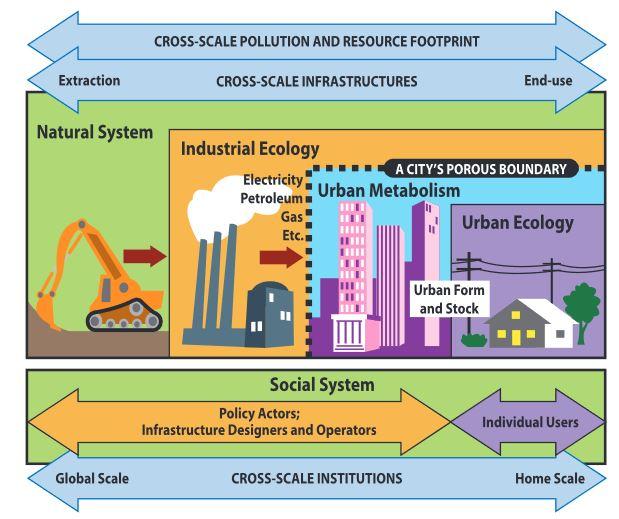
A Social-Ecological Infrastructural Systems (SEIS) Framework for Inter-Disciplinary Study of Sustainable City-Systems: An Integrative Curriculum across Seven Major Disciplines
Type
Cities are embedded within larger‐scale engineered infrastructures (e.g., electric power, water supply, and transportation networks) that convey natural resources over large distances for use by people in cities. The sustainability of city systems therefore depends upon complex, cross‐scale interactions between the natural system, the transboundary engineered infrastructures, and the multiple social actors and institutions that govern these infrastructures. These elements, we argue, are best studied in an integrated manner using a novel social‐ecological‐infrastructural systems (SEIS) framework. In the biophysical subsystem, the SEIS framework integrates urban metabolism with life cycle assessment to articulate transboundary infrastructure supply chain water, energy, and greenhouse gas (GHG) emission footprints of cities. These infrastructure footprints make visible multiple resources (water, energy, materials) used directly or indirectly (embodied) to support human activities in cities. They inform cross‐scale and cross‐infrastructure sector strategies for mitigating environmental pollution, public health risks and supply chain risks posed to cities. In the social subsystem, multiple theories drawn from the social sciences explore interactions between three actor categories - individual resource users, infrastructure designers and operators, and policy actors - who interact with each other and with infrastructures to shape cities toward sustainability outcomes. Linking of the two subsystems occurs by integrating concepts, theories, laws, and models across environmental sciences/climatology, infrastructure engineering, industrial ecology, architecture, urban planning, behavioral sciences, public health, and public affairs. Such integration identifies high‐impact leverage points in the urban SEIS. An interdisciplinary SEIS‐based curriculum on sustainable cities is described and evaluated for its efficacy in promoting systems thinking and interdisciplinary vocabulary development, both of which are measures of effective frameworks.

